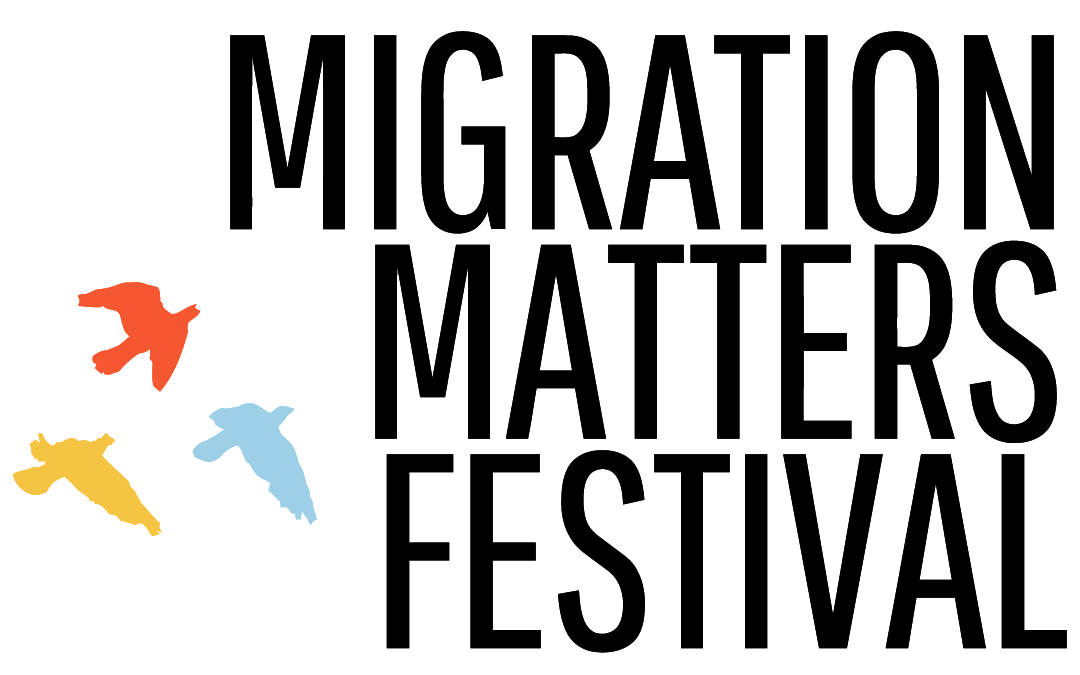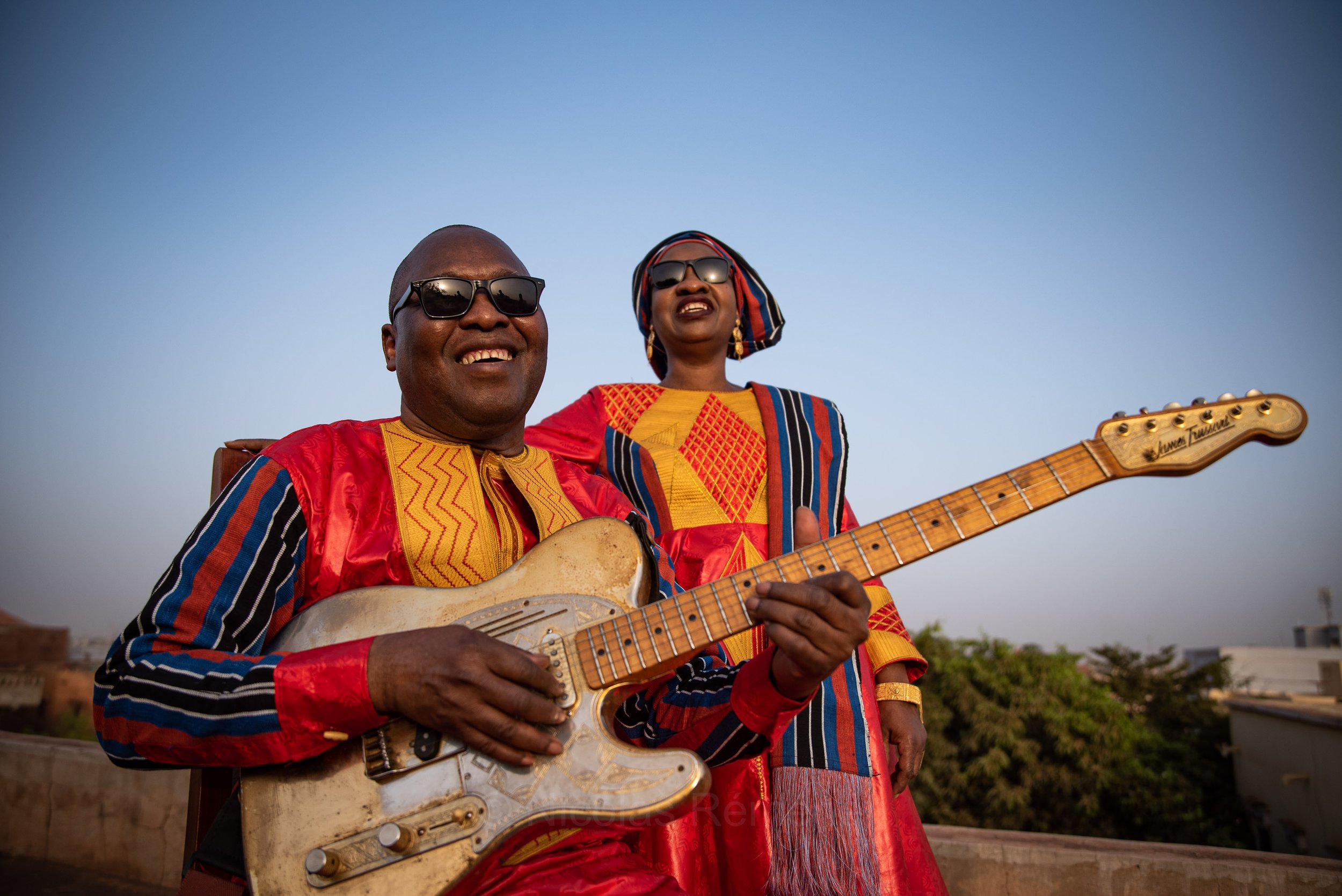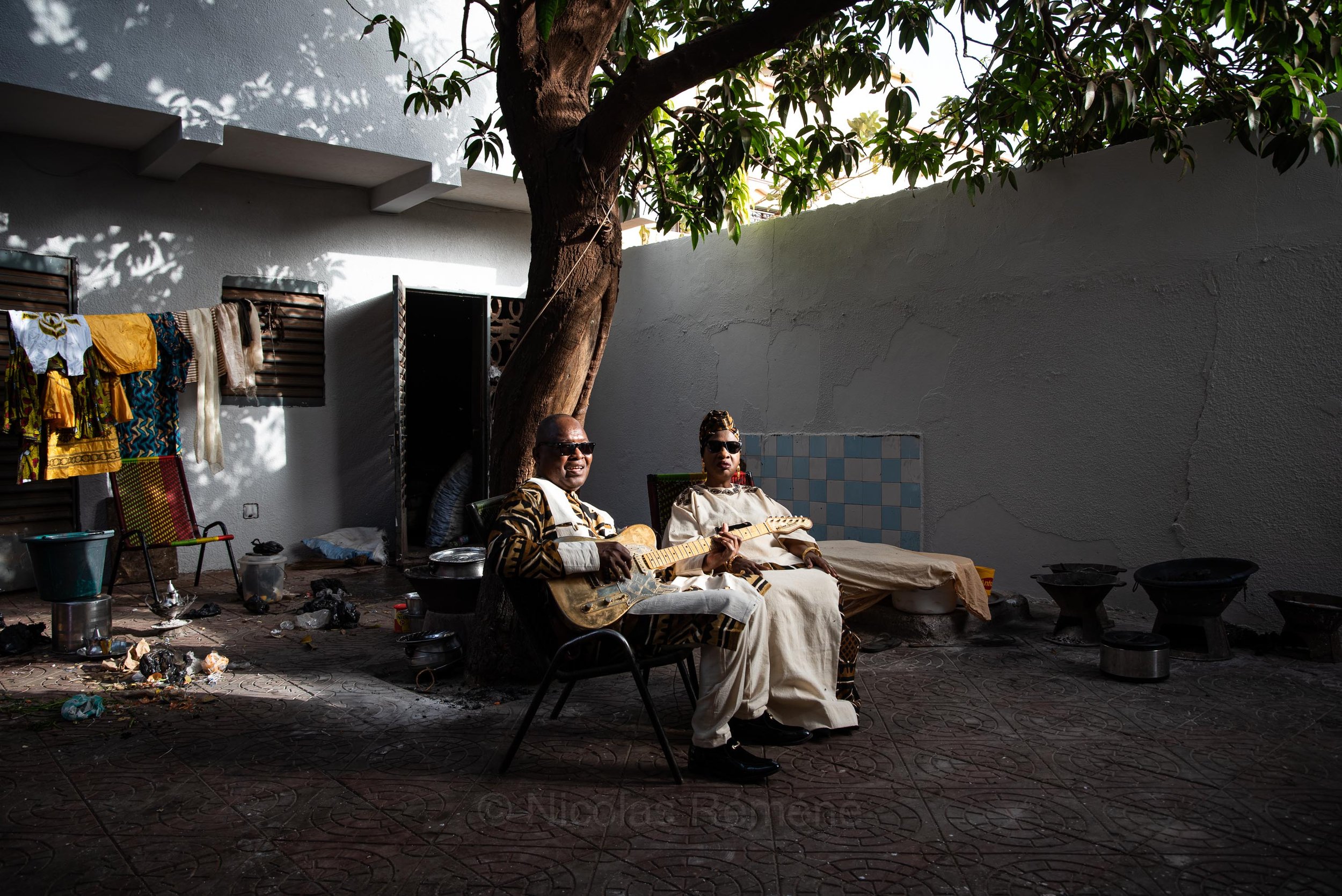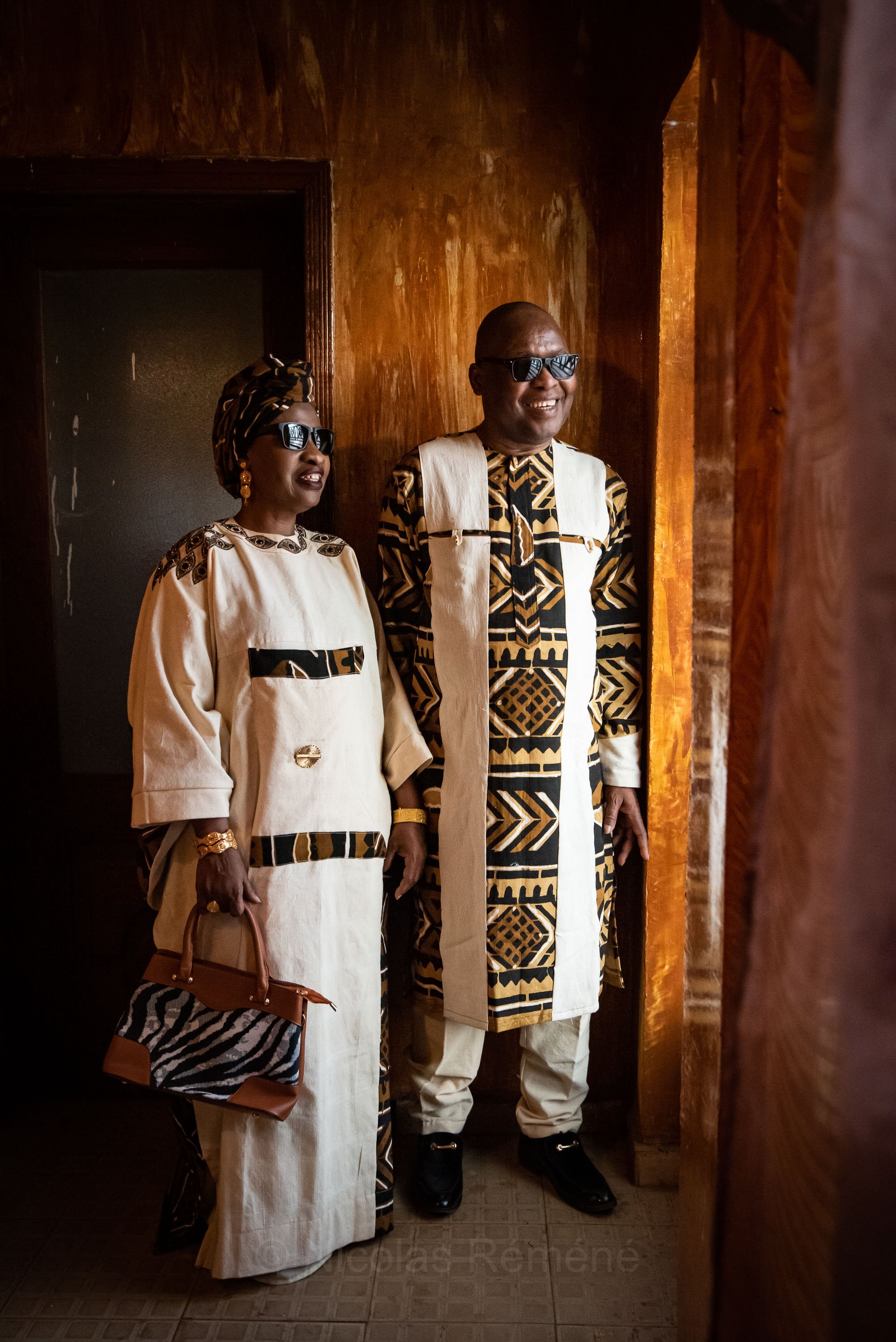AMADOU & MARIAM
Migration Matters Festival x La Rumba present
17 June | 19:30 | Venue: The Leadmill
“We love what we do”
Amadou and Mariam’s story is one of the most inspiring tales in the music world; a love affair that propelled two veterans of Mali’s music industry, who first recorded together in the 1970s, into charts around the globe in the 21st century, winning enough awards to fill several sideboards in their home on the outskirts of Bamako and raising awareness of the difficulties in living in one of the world’s poorest countries.
About AMADOU & MARIAM
Into their orbit came such stars as Manu Chao, David Gilmour, the Yeah Yeah Yeahs, Scissor Sisters and Damon Albarn, who told The Observer: “I don’t think there’s ever been a band from Africa with whom people have engaged in quite such a way.” Yet it is also a story that began in adversity and continues to evolve and inspire more than 40 years after it began.
Amadou Bagayoko was born in Bamako, Mali, in 1954, six years before the country declared independence from France. With eyesight that had been failing from birth, as a young boy he was unable to join in any communal outdoor work, but would play his flute to entertain fishermen and often found making music a more lucrative way to pass the time. A love of rock and blues meant that the teenage Amadou swapped his flute for a guitar in 1967 and was taken under the wing of the Guinean guitarist Kanté Manfila.
As the 1970s dawned, Amadou, though now completely blind, was one of Mali’s busiest musicians, making a living playing Cuban songs for growing crowds, and in 1974 he joined Manfila and the singer Salif Keita in Les Ambassadeurs du Motel de Bamako, the city’s most progressive big band. Idrissa Soumaoro, Les Ambassadeur’s sighted keyboard player, worked at Bamako’s Institute for the Young Blind. Among his favoured students was Mariam Doumbia. Four years younger than Amadou and blind from the age of five, she was an accomplished songwriter.
In their joint autobiography, ‘Away From The Light Of Day’, Amadou explained why he suggested he help arrange her songs. “My real motivation was Mariam herself. Her beautiful voice, that is. The lyrics touched me because they reflected her sadness and the hypocrisy with which society often treats disabled people. I told her music was a good way to discover that we had a place in society. People would like us because we sang well and this meant we would be able to cut through obstacles; we could get by in life and forget a little about our handicaps.”
In 1980, the couple got married and played their first gig together. Live shows paid poorly, however, and there were no singles or albums because there were no recording studios in Bamako – almost the only place where music could be captured on tape was the national radio station, where the likes of Ali Farka Touré could often be seen recording. “Really, there was no music industry in Mali,” says Amadou. “It was not easy to buy recordings of Malian singers on vinyl or cassette then.”
In 1994, a Malian expatriate invited them to play a concert in France; there, they met Marc-Antoine Moreau, a fan who had discovered their music while travelling in Africa and believed passionately that they had what it takes to connect with audiences all around the world. Taking him on as manager would be a crucial step. Three years later, their first single, ‘Je Pense À Toi’ was a hit on French radio. The trio of albums that followed – ‘Sou Ni Tilé’ (1998), ‘Tie Ni Moussou’ (1999) and ‘Wati’ (2002) – demonstrated how adeptly the duo could take their rock and soul heroes’ music and add an African twist to it. In September 2003, Amadou & Mariam and the Franco-Spanish singer Manu Chao set up camp in Studios Davout in Paris to record the album that would be their breakthrough. In January 2004, the trio performed live together for the first time at the famous ‘Festival in the Desert’ near Timbuktu, playing songs from their next long-player, ‘Dimanche A Bamako’, to a select group of hardy travellers. “Manu Chao had enriched our music,” says Amadou. “Each time we made an album we hoped it would be a big success, but we really didn’t know about that one.”
“We didn’t know if it was good until we received a gold disc,” interrupts Mariam. “Then we realised it was ok.” It went to No. 2, was certified triple platinum (selling more than 500,000 copies) and spent 101 weeks on the French album charts. In early 2005, they won the ‘Victoires de la Musique’ prize, the French music-industry’s equivalent of a Grammy, for ‘Best Reggae/Ragga/World Album’, and two honours at the BBC Radio 3 Awards for World Music. “A lot of people in a lot of places got to know about Sundays in Bamako,” laughs Amadou. “We have always wanted to break barriers and open ears to new sounds, to bring Malian music to people around the world in a form they could understand and enjoy.”
The rest of that decade passed in a blur as Amadou & Mariam became Africa’s hottest musical export. They toured constantly, becoming regulars at Damon Albarn’s ‘Africa Express’ events, where each concert meant collaborating with the likes of Johnny Marr or Flea from the Red Hot Chili Peppers. Amadou’s musical hero, David Gilmour, formerly of Pink Floyd, enlisted him as second guitarist for a London date. The duo appeared on the Main Stage at Glastonbury, crisscrossed America, supported Blur at Hyde Park, toured with Coldplay and U2, performed at a Nobel Peace Prize concert in honour of Barack Obama - “He was cool,” says Amadou, admiringly - and played at the opening ceremonies of the 2010 and 2014 FIFA World Cups. The duo also debuted their ‘Eclipse’ concerts, shows that take place in total darkness, allowing their audiences to experience the music in the same way they do.
After ‘Dimanche A Bamako’ came ‘Welcome To Mali’ (2008); their second Victoires de la Musique award-winner and another gold record; 2012’s ’Folila’ (the title means ‘music’ in Bambara, the couple’s first language); and ‘La Confusion’ (2017), which was their third album nominated for a Victoires de la Musique award. This quartet of albums expanded the Amadou & Mariam palette by introducing their African soul music to electro-pop, art-rock and hip-hop.
“We love to listen to all kinds of music in order to find new influences for our personal sound,” says Mariam. “We are really passionate about blending different types of music and genres.” Yet listeners could also follow the songs as a commentary on Mali’s slide from optimism and peace into chaos and insurgency after 2012, as instability in the north gave way to violence and the collapse of the government.
In 2014, Mariam joined with fellow Malian legends Mamani Keïta and Oumou Sangaré in founding Les Amazones d’Afrique, an all-female collective promoting gender equality and the end of violence against women. Their first album, ‘République Amazone’, was released in March 2017, with Barack Obama nominating the track ‘La Dame Et Ses Valises’ as one of his favourites of the year, and the corresponding tour included dates in Bamako, Paris and Wroclaw.
With ‘La Confusion’ also released in 2017, European and North America tours kept them on the road from May to November, with festival dates and television appearances squeezed in alongside appearances in Africa and a charity appearance in Beirut for Skoun, a non-governmental organisation that works with people suffering from addiction problems in Lebanon.
“Since the beginning of our career we have been involved with charity work,” says Amadou. “In Bamako we held concerts to support the Institute for Blind and publicise their work. In 2009 we became Ambassadors for Culture at the Zeitz Foundation, and we played a show in support of the homeless charity Crisis in London. In 2010 we contributed to the Enough Project’s ‘Raise Hope’ compilation, raising funds for women’s rights and peace in Congo. We have been ambassadors for the World Food Programme since 2012, supporting campaigns. This is a natural part of our career, but the fact we are well known means that we can help just by our presence. We feel blessed to be able to use our voices, image and music to support these causes.”
Although there was no new album in 2018, the duo kept busy with African and European dates, a headlining show at WOMAD and a return to the Far East in November. “This was our second trip there,” recalls Amadou.“This time the audiences in Singapore and Hong Kong welcomed us very warmly. Perhaps we were not as well known there as in Africa, America or Europe, but there was the sense of excitement and surprise that we love - they were discovering us and and we were learning about a new culture, too.”
The global success of Amadou & Mariam should be a reminder that people can triumph over adversity, that with cooperation, enthusiasm and dedication, we can succeed even when everything seems to be against us. The famous “Blind Couple From Mali have a positive message to send out:
“We know that music, films and art have always been very important, but they have been especially so during lockdown. Hopefully, we will be able to meet again with all our fans from around the globe with new music and new projects. We have been working on several music collaborations that will be released during 2021, and on our new album, too. We look forward to telling you more about that soon.”
-
£25 | £18 | £6
-
Doors open - 19:30
Running time - 19:30- 22:30
Please note this is subject to change
-
The Leadmill
6 The leadmill
Sheffield S1 4SE -
14+
-
The Leadmill have space for two wheelchairs, and four high-backed stools.
For further info on bookings and Personal Assistant Tickets, please visit:
-
Monday 17th June, 2024
19:30 - 22:30
Tickets £25/£18/£6



